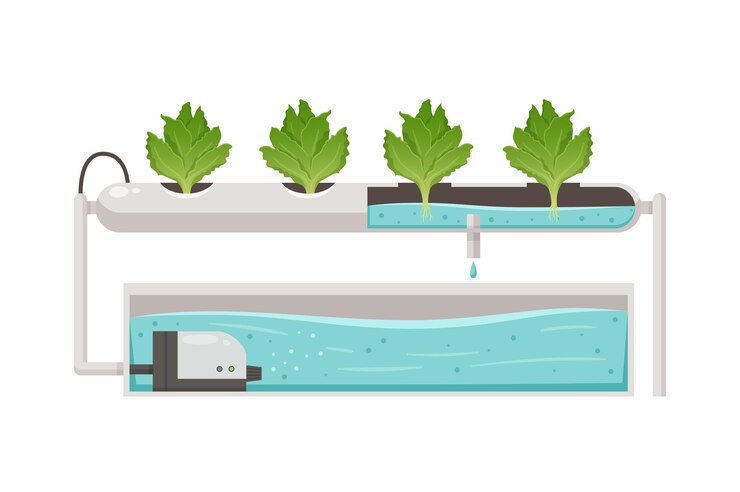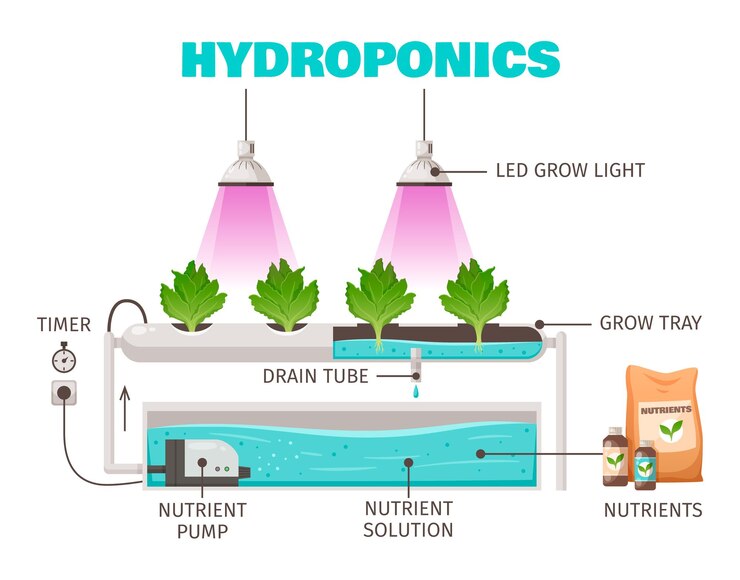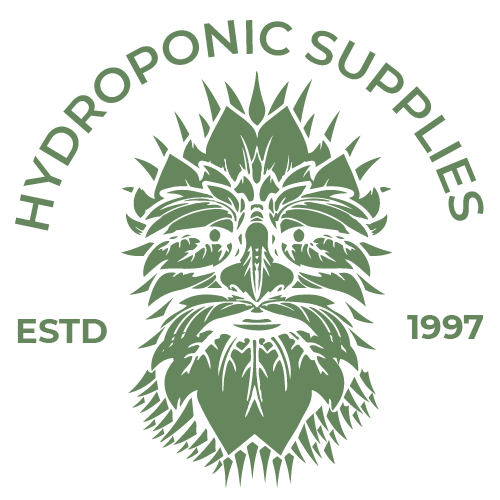
Do you want a lush garden at home all without a speck of soil?
Welcome to the world of hydroponics!
Where the future of gardening is rooted in water, nutrients, and ingenuity. When you’re looking to start a hydroponic setup. You must have the correct equipment to ensure that your plants grow efficiently.
In this article, we will discuss the must have hydroponics equipment that you need to get started. Let’s dive in and explore the essentials.
Hydroponic Systems
Hydroponic gardening involves growing plants in nutrient-rich water without soil. The success of your hydroponic garden relies on choosing the right hydroponic system for your plants.
System Selection
The success of your hydroponic garden hinges on choosing the right system; factor in plant size, growing medium, and space availability.
- Nutrient Film Technique (NFT): Optimal for small plants with shallow roots, NFT circulates a nutrient-rich water stream over roots for continuous nourishment and oxygenation.
- Deep Water Culture (DWC): Ideal for larger plants, DWC suspends roots in nutrient-rich water, with an air pump ensuring root oxygenation for robust growth.
- Ebb and Flow Systems: Versatile for various plants, this system periodically floods a grow tray with nutrient solution, then drains, mimicking natural tidal movements for plant nourishment.
Must Have Hydroponics Equipment
1. Grow Lights
Hydroponic plants require sufficient light for healthy growth. An essential among the hydroponics equipment list. There are different types of grow lights available in the market, including:
- LED lights,
- High-Intensity Discharge (HID) lights,
- Compact Fluorescent Lights (CFL)
However, LED grow lights are the most popular choice for hydroponic setups due to their energy efficiency and customizable light spectrum.
When choosing the right grow light for your hydroponic plants, consider your budget, the size of your grow space, and the growth stage of your plants.
LED lights are cheaper compared to other grow lights. They convert more energy into light and produce less heat.
| Grow Light Type | Pros | Cons |
| LED Grow Lights | Energy-efficient, customizable spectrum, long lifespan | High upfront cost |
| HID Grow Lights | Proven technology, suitable for large grow spaces | Produces a lot of heat, high power consumption |
| CFL Grow Lights | Low cost, easy to set up | Not suitable for large grow spaces, limited spectrum |
2. Water
The lifeblood of your hydroponic setup is water. Not just any water, though. It must be pure for your plants to truly flourish.
Begin by testing your tap water to understand its pH and mineral content. This initial step is crucial because the wrong pH can spell disaster for sensitive roots.
When it comes to hydroponics you need precise measurements for your plant’s water needs. Overwatering and underwatering are missteps you can’t afford. Ensure your system has a generous supply.
Remember: It’s better to have a little too much water than not enough —plants can’t thrive if they’re thirsty.
3. Basin: Plant’s Hydration Station
Third on the hydroponics equipment list is a basin. The basin is more than a container; it’s a cradle for your plant’s roots. Whether you’re using storage bins or custom reservoirs. The size and maintenance of your basin are paramount to your garden’s success.
Plants Size Matters
Calculate the volume of your basin based on the number and type of plants you’re cultivating. Each plant’s water requirement is different, so supply accordingly. For instance,
- For a small herb, like basil or cilantro? Think half a gallon of water.
- For a towering tomato plant? Think bigger—much bigger.
Algae Prevention and Water Changes
Algae are the uninvited guests at your garden party. Keep them out by maintaining a clean, light-proof water basin. Change the water regularly, especially when you switch fertilizers.

4. Growing Mediums
Growing mediums play a critical role in hydroponics by providing support for your plants’ roots. Unlike traditional soil gardening, hydroponic systems use a variety of growing mediums to promote healthy plant growth.
There are several types of growing mediums available in hydroponics equipment stores near you, including:
| Growing Medium | Description | Benefits |
| Perlite | White, lightweight, and porous volcanic rock | Good drainage and aeration, pH neutral, reusable |
| Vermiculite | Natural mineral that expands when heated | Good water retention, nutrient retention, pH neutral |
| Coconut Coir | Fibrous material made from coconut husks | Good water retention, pH neutral, renewable |
Each growing medium has its unique benefits that make it suitable for different hydroponic plants and setups.
Speak to an expert at your local hydroponics store near me to find the best-growing medium for your hydroponic setup.
5. PH and EC Meters
When it comes to hydroponic gardening, pH and electrical conductivity (EC) are critical variables to monitor and maintain.
- pH is an indication of the acidity or alkalinity of your nutrient solution.
- While EC measures the concentration of nutrients in the water.
Both of these factors affect the uptake of essential nutrients by your hydroponic plants.
To ensure optimal plant growth, it’s essential to keep the pH and EC levels within the recommended range. This can be accomplished using pH and EC meters.
These are readily available at hydroponic shops near me.
6. Ventilation and Air Circulation
Proper ventilation and air circulation are vital components of a healthy hydroponic system. Without proper air circulation, the humidity and heat can build up. This increases the risk of disease and pest infestations.
A ventilation system helps regulate the temperature and humidity levels. It replaces stale air with fresh air. Fans are also important hydroponics equipment. They help provide a constant supply of fresh air to your plants. Preventing mold and mildew growth.
7. Temperature Control
Steady temperatures are vital. Your plants aren’t just growing; they’re living. They react to temperature changes just like we do.
Find that cozy sweet spot that keeps them happy around the clock. Invest in a quality thermometer and possibly a thermostat-controlled heater or cooler.
8. Elevated Growth Trays and Tables
Trays and tables aren’t just furniture. They support your plants and allow for the necessary airflow and drainage.
Tailor your hydroponics equipment setup to your space and the specific needs of your plants. Ensure efficient drainage to prevent root rot and other water-related issues.
9. Fertilisers & Nutrients
Your plants’ diet is entirely in your hands. You’re the chef in a restaurant for roots, serving up a broth of nutrients essential for growth.
Your hydroponic plants need you to supply essential nutrients, lacking the natural minerals found in soil.
Macro vs. Micro: Balancing Plant Nutrition
They require both
- Macronutrients like nitrogen, phosphorous, and potassium in ample amounts.
- Micronutrients like boron and iron in smaller doses.
Each plant species has its unique nutrient needs. You can either mix these nutrients individually or get premixed solutions for different growth stages. Such as those provided by Floraflex. Search online for a ‘hydroponics near me’ to get both individual and premixed nutrient solutions.
Green Beginnings: Start Your Hydroponic Garden Today!
With the right toolkit in hand, you’re ready to embark on your hydroponic Perth journey.
Start simple, learn as you grow, and don’t be afraid to experiment. Start investing in quality equipment from a hydroponic shop near me.
Hydroponics is as much an art as it is a science, and every great artist was once a beginner.
Happy gardening!
FAQ
What equipment do I need for hydroponics gardening?
For hydroponic gardens, you need essential equipment such as a hydroponic system, grow lights, nutrient solutions, pH and EC meters, and proper ventilation for air circulation.
What types of hydroponic systems are available?
There are different hydroponic systems available, including nutrient film technique (NFT), deep water culture (DWC), and ebb and flow systems. Each system has its advantages and is suitable for different plants and growing environments.
Why are grow lights important in hydroponics?
Grow lights provide artificial light for hydroponic plants. LED grow lights are popular due to their energy efficiency and customizable light spectrum, which can be adjusted to meet the specific needs of your plants.
What are nutrient solutions and why are they necessary?
Nutrient solutions are balanced blends of macro and micronutrients that provide essential nutrients to hydroponic plants. They are necessary for healthy plant growth and optimal nutrient uptake in a soil-less growing environment.
What are the different growing mediums used in hydroponics?
Hydroponics relies on growing mediums such as perlite, vermiculite, and coconut coir to support plant roots. These mediums provide stability and moisture retention, helping plants thrive without traditional soil.
Why is monitoring pH and EC levels important in hydroponics?
Maintaining the correct pH and electrical conductivity (EC) levels is crucial for nutrient availability and uptake in hydroponic plants. pH meters and EC meters help you monitor and adjust these levels for optimal plant growth.
Why is ventilation important in hydroponic systems?
Proper ventilation and air circulation prevent the buildup of heat and humidity in hydroponic systems. Ventilation systems and fans are necessary to regulate temperature and ensure a constant supply of fresh air, creating a conducive environment for plant growth.
